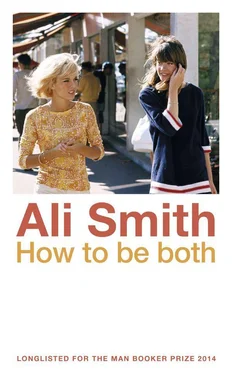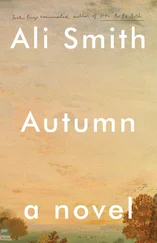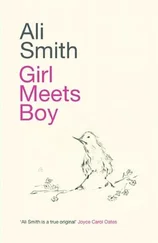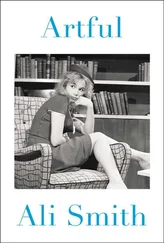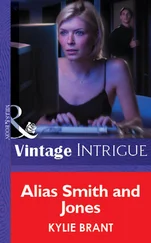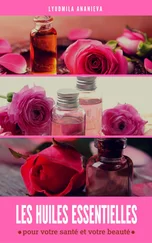She turns on the chair. H is in the doorway.
Your dad let me in, she says. I went up to your room but you weren’t there.
H had decided earlier that day at school that a good way to do revision would be for them to transfer what they needed to remember into song lyrics and learn to sing them to the tune of some song they both know. This, H says, will make information unforgettable. They both have a test next week in biology and George also has a test in Latin.
So what we can do, H said, is: I’ll make up the biology version and we can learn it off by heart then you can translate it into Latin for double the benefit.
They’d been standing in the corridor outside history.
What do you think? H had said.
What I’m thinking is, George said. When we die.
Uh huh? H said.
Do you think we still have memories? George said.
This was her test question.
H wasn’t even fazed. She was never fazed by anything. She made a face, but it was a thinking face.
Hmm, she’d said.
Then she’d shrugged and said,
Who knows?
George had nodded. Good answer.
Now H is here, turning on one foot and looking at all the piles of books and papers and pictures.
Wow. What a place, she says. What’s this place?
What’s this place? George turns on the swivel chair her mother specially bought for this study and catches, at the corner of her eye, the framed and printed-out first-ever Subvert. It’s a list of the names of all the women art students who went to an art college in London over three years at the end of the nineteenth and the beginning of the twentieth centuries. This list with no explanation attached flashed up for a month on the online pages of anyone who looked up the word Slade (including people who’d chanced to be looking up things about the band with all the old men in it who wrote that Christmas song). It came about because George’s mother had been reading a biography of a quite famous artist from the turn of that century and had become more and more interested in what had happened to his wife, whom he’d met at the same art school. She’d been a student too but had died really young after having more children than her body could handle having (George’s mother is a feminist). (Was.) Before this woman died (well obviously) she had had a friend called Edna who was also a student at the school. In fact Edna’d been one of the most talented artists in the place. Edna had gone on to marry a well-to-do type. One day this well-to-do type had come home to find Edna’s paints and brushes spread out on the dining-room table and had told Edna to put all this rubbish away. It was before Henry was born. George and her mother and father were on holiday in Suffolk staying in a cottage. Her mother had been reading this book. She got to the page where this happened to Edna and she burst into tears in the garden. That’s the story. George has no memory of it but the story goes that her mother raged round the cottage’s garden like a mad person and that the letting agency had sent a bill afterwards for some of the plants she’d wrecked. Your mother is a very passionate person, her father always said whenever the story got told. Anyway Edna’s life hadn’t been so bad after all in the end because the husband had died quite early on and she herself had gone on to live till she was a hundred and to show lots of pictures in galleries and even to be called, by a reputable newspaper, the most imaginative artist in England (though she did have a nervous breakdown at one point, and at another point in history her studio got hit by a bomb and totally destroyed along with lots of her work).
All of this information flashes through George’s head in that fraction of a second it takes to do the single swivel round towards H in her mother’s chair and say the words:
It’s my mother’s study.
Cool, H says.
She puts a piece of paper with her writing all over it down next to George on the desk. She picks up a picture off the top of a pile of letters. George looks to see what she’s picked up.
She liked that picture so much, George says, that we went all the way to Italy to see it.
Who is it? H says.
I don’t know, George says. Just some man. On a wall. In a kind of blue space.
Who did it? H says.
I don’t know that either, George says.
She looks down at the song she’s meant to translate into Latin. She has no idea what the Latin for DNA will be.
To The Tune Of Wrecking Ball
(Verse 1)
Herr Friedrich Miescher found it in / some pus in 1869 / Crick, Watson and Ros Franklin saw / the two strands intertwined like vine. / Double helix in 1953 / X-Ray photo ’52. / Franklin died before Nobel Prize Award / Life not one strand but two.
(Chorus)
G — A - T — C and D — NA / Deoxyribonu-cleic / Guanine-adenine-thymine cytosine / Supercoil can be both / Po — o - si tive / Yeah and /Ne — e - g a tive.
(Verse 2)
Plants fungi animals make up / The eukaryotes / Bacteria and archaea / The prokaryotes / It’s A&T or it’s G&C that’s the / Only way it will do / Two long chromosomes, codons three letters long / I will always want you.
H is still standing looking at the picture of the man in rags.
That last line’s just there for scansion, she says. While I decide what else to use.
She holds up the picture of the man.
When in history is this from? she says.
It’s from a palace, George says. If you look up the words Ferrara Palazzo in Images, Ferrara’s the place we saw it, you’ll probably find it.
She looks at the song again.
I don’t think I can translate much more than three or four lines of this into Latin, she says. A lot of it also already looks pretty Greek.
Do the last line first, H says.
She is sort of grinning. She is looking away, still looking at the picture of the ragged man.
The one line we’re not going to need or use and that’s the one you want first in Latin? George says.
I’d just quite like to hear it in Latin, H says.
She is grinning broadly now and still looking away. She sits down on the floor.
She’s waiting.
Okay, George says. But can I ask you something first?
Yep, H says.
It’s a hypothetical, George says.
I’m not much good with them, H says. I’ve been known to faint whenever I see a needle.
George gets off her mother’s chair and comes and sits opposite H cross-legged on the floor too.
If I were to say to you that while my mother was alive she was being monitored, she says.
For health, or? H says. For diet, or what?
George speaks a little more quietly because her father doesn’t like her saying this stuff, she made it up to distract herself from her life and how do you think that makes me feel, George? And you’re making it up to distract yourself from her death. She was being adolescent. So are you. Get a grip. Interpol and MI5 and MI6 and MI7 were not interested in your mother. He has specifically instructed her to stop it, and has been known to lose his head about it if George does mention it, even though he’s being generally self-consciously gentle at most other times, what with everything being so post-death.
By people in, you know. Like on TV, George says. Except not like on TV, there weren’t bombs or guns or torture or anything, there was just this person. Sort of keeping an eye on her.
Oh, H says. That kind of monitored.
If I were to say it, George says. Would you think words like deluded and paranoid and needs to be put on some kind of medication?
H thinks about it. Then she nods.
You would? George says.
Not living in the real world, H says.
Something inside George’s chest falls. It is a relief, after all, the kind of relief where everything feels both bruised and released.
Читать дальше
